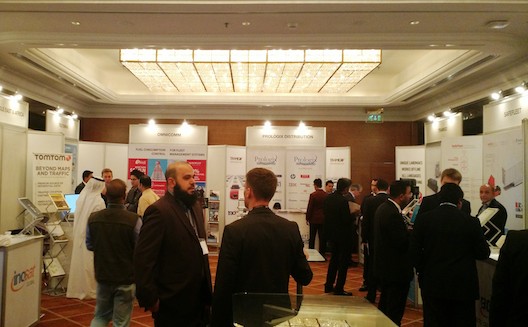Telematics in the Middle East growing at light speed

The decision to organize the Telematics Conference Middle East & Africa in Dubai in March wasn’t by chance.
“We have been organizing this event in South-Eastern Europe for years now and so we decided to hold it this time in a different region of the world,” said Alenka Bezjak Mlakar, conference director. “We saw that the markets in Western Europe and the USA are too mature, and so we decided to cover the Middle East and Africa region since its market is fragmented and the conference might help put it on the right path.”
The goal of the conference is for companies and business people in the telematics space to meet and share insights under one roof.
Telematics is a broad field at the intersection of telecommunications, logistics management, big data, and sensors (like GPS locators). It has the potential to streamline operations for companies that need to track multiple moving components, like a fleet of vehicles.

Attendees mingle at the Telematics Conference, March 2 in
Dubai. (Images via Pamela Kesrouani)
The conference was the first of its kind in the Arab world, and sought to establish industry frameworks for the region. Objectives included bringing knowledge to the region, embracing the development of telematics in the region, and connecting influential stakeholders from both inside and outside the Arab world, Mlakar noted.
The Arabic market is fragmented
Participants agreed that while the Middle East and Africa market might be the smallest in the world, it is growing at light speed. “In the past, we used to describe the market as ‘emerging;’ today, we describe it as ‘expanding’ because more and more people are driving cars and thus need these technologies in their vehicles and ask for the same quality offered in Europe,” says Louis Debatte-Monroy, product line manager for TomTom Africa.
Dominique Bonte, ABI Research vice president, pointed out that the Middle East and Africa markets offer many opportunities but still lag behind for many reasons, like regional diversity (regions and countries widely vary in terms of growth), lack of stability, and lack of roads and infrastructure. He added that the region has high potential in terms of telematics due to the increase in competition and the availability of products and solutions, as well as certain events set to be held in the future such as the 2022 FIFA World Cup in Qatar and the Expo 2020 Dubai.
What is the potential for telematics in the region?
Telematics can impact several sectors in the region, Bonte noted. They include transportation, logistics, mining, oil and gas, utilities, agriculture, government, and personal transportation.
For his part, Zaim Azraq, CEO of Location Solutions noted that telematic services have multiple benefits. They include:
-
An economic impact: Reduction of operation costs, fleet optimization, driver and vehicle monitoring, reduction of vehicle accidents, preventive maintenance (fuel and wheel costs are critical for fleet management).
-
An environmental impact: Reduction of carbon dioxide emissions.
-
Social impact: Increase of road safety and reduction of reckless driving, increase of security (tracking devices to recover stolen vehicles).
-
An information impact: Reduction of communication with the driver (no need to call the driver to determine his location or whether or not he completed his task), targeting drivers’ weaknesses for improvement.

Omnicomm CEO Boris Pankov discusses changing mentalities in the
MENA.
Challenges in the region
The speakers agreed that the Middle East offers many opportunities but still lacks in some areas, and faces many challenges that prevent it from leading the telematics’ industry, mainly:
-
Lack of understanding: Antanas Segzda, Sales Director for Southern Europe in Teltonika said clients don’t understand the concept of telematics or fleet management. “They mainly look at prices without caring about the service they are receiving,” he said. The issue will need years. It’s a point that Azraq also stressed by saying that some customers don’t even know what a global positioning system is, and even if they do, they don’t know how to use it.
-
Need for partnerships with international actors: Boris Pankov, CEO of Omnicomm, which specializes in fuel level monitoring, stressed on the fact that the Middle East is witnessing a change in mentalities, making it more productive. He emphasized the need for partnerships between local and international players, where everyone would be a winner. “We bring them experience, services, and products, and in exchange, they open their markets to us and attract customers,” he said. For his part, Segzda said that such partnerships would help the region jump faster on the telematics bandwagon because local players would not have to start from scratch, but rather rely on systems that we have already developed in a way that fulfills the market’s needs.
-
Amendment of laws: Amendments must be made for laws to accommodate a changing market. Azraq gave an example by saying that some devices are allowed in Dubai but banned in Saudi Arabia.
-
Telecommunication price reduction, which would reduce many of the high costs that telematics providers incur, especially in the absence of a uniform price list for Gulf countries, according to Azraq.
-
Unfair competition: The private and public sectors need to cooperate to face unfair competition, especially with many low-quality telematics devices on the market.
Finally, telematics is still an emerging industry in an emerging region and will need many years to mature in the MENA region.


